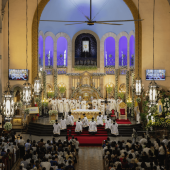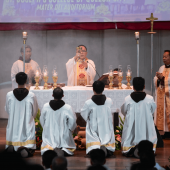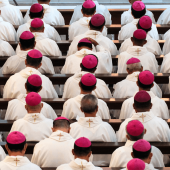Give your heart to whatever tasks or mission that is given to you, says Bishop of Cubao
A bishop counsels those who have been entrusted with the labor of the Lord to devote their complete hearts to the assigned mission or duty rather than choosing the type of labor they wish to perform.
“I thank God for whatever the Lord assigns me; I just give my best because the work belongs to the Lord. We are just shadows. We are just laborers. So, we just don't choose what kind of work we do. What's important is that you give your heart to whatever you know, whatever tasks or missions are given to you,” says Honesto Flores Ongtioco, of the Diocese of Cubao in the Philippines, in an exclusive interview with Fr. Kasmir Nema of Radio Veritas Asia.
He has served in the Diocese of Cubao since August 28, 2003, during the Feast of Saint Augustine, which used to be a district of the Archdiocese of Manila, for nearly 20 years, and he found the second assignment to be a big transition from the rural setting. That was on August 28, 2003, during the Feast of Saint Augustine.
The diocese has the largest number of religions: 93 congregations for women and 42 for men, plus some consecrated people. Despite the challenges during the pandemic, as a missionary, he found ways to visit, especially the poor, like those in the infirmary, either in person or via Zoom. The religious service there had been creative, bringing music, cooking, and other activities.
For the coming years, he said they had to prepare the people. “That's part of evangelization to choose good leaders, which turned out to be useful during the national and local elections." We gave our best in trying to prepare our people, trying to help them realize that it's important that they are also clear about their values. Through the years, something has come up, like the concept of synodality—working together. Pope Francis emphasizes this synodality, the idea of listening more. “
“As a young boy, I felt so good being at the service of people doing something good. I'm always at the service of the church, he said.
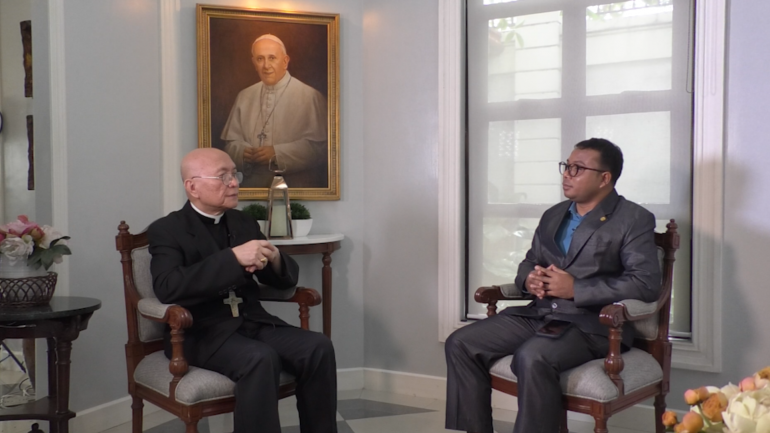
Bishop Ongtioco studied in Catholic schools, and outside of school, he would serve as the local parish priest. He enjoyed going to the remote areas where they had mass once a month and experienced cleaning the pews and ringing the bell while the priest was preparing the altar. He studied with the Benedictine sisters Scholastica for his primary, stayed with the Salesian priests for six years in intermediate high school, and then, after the fourth year of high school, thought of pursuing priesthood.
He underwent Jesuit formation for nine years. Then he said he had an enriching year of exposure with the blacks in New York, and part of it was in some Spanish communities. Then he studied in Rome to work on his relationship with spirituality for two years, then was exposed to migrant workers in Rome.
He was happy serving the Filipinos, who were around 30,000 Filipinos in Italy and must have grown to more than 200,000 today. At the same time, he worked on his doctorate. His archbishop, then Cardinal Sin, thought he did not belong to Manila but to the Archdiocese of Fernando as a vice-rector of the College of Filipinos, which is not a school but where Filipino priests from the Philippines stay.
They go to different schools, like Gregorian Angelico and Shanome. He became vice director and eventually rector, supposedly for three years. But in less than a year, he was appointed bishop.
“I never thought it was ever in my dream. As I tell people, just being a good priest is very, very difficult. But I spoke about obedience during my Thanksgiving mass in celebration of my 25th year as a priest. And I said I'm always at the service of the church. And then, after just two or three months, I was called by the Vatican, and I was asked to consider being a bishop. And as I said, you know, I said obedience, and here I am. So, it's that easy,” said Ongtioco.
Asked how his Episcopal motto “The greatest thing is to love” inspires and guides him, he talked about the importance of faith, knowing more about Jesus, and hope not just in this world but in what God has promised with his son and then love. “The greatness of what Saint Paul tells us is love because God is love, and whatever you do, you do it with love,” he said.
The result is just different because if you do it just out of obligation, your duty, the results, and the truth of what you are doing are not that great. “But when you do things out of love, that's what I see in missionaries; whether they are Jesuits, SVDs, Dominicans, Carmelites, or any other missionary, I always see that passion, that love in their hearts. Going to faraway places makes people aware of God's invitation to come to him,” he said.
He added, “As Jesus tells us, if you love me, you know you will keep my commitment. You can use love as a noun or as a verb. As a sinner, it appears nine times as a verb. So, love is action. Love is doing something, forgiving the patient, and being compassionate. It's always concrete. We can set the world on fire only if our hearts are burning with love. All the if there is that fire in your heart.”
Read the full transcript of the interview below.
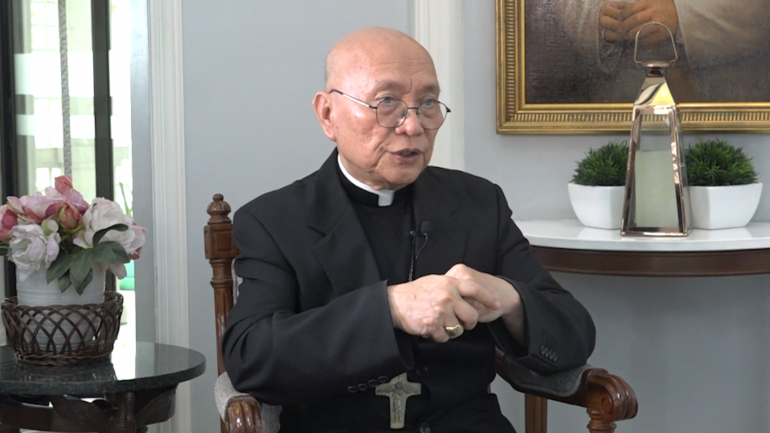
VOICE OF ASIAN BISHOPS
RVA Interview with Cardinal-elect Sebastian Francis of Penang by Fr. Kasmir Nema, SVD, from Radio Veritas Asia.
Fr. Kasmir Nema: How are you today?
Bishop Honesto:
Well, quite busy. It seems we have what you call a new normal. I'm coming. I'm going back to a busy schedule, unlike before, during the height of the pandemic. You know, a lot of schedules had to be postponed because of the pandemic. But then, of course, we are still in the pandemic. But there is more room to just travel and mix with people.
Fr. Kasmir: That's great to know about yourself. You have served in the Diocese of Cubao for nearly 20 years. Can you give us a general picture of your diocese, Bishop?
Bishop Honesto:
So first of all, it is a big transition for me because this is my second assignment. So before I was doing the other kind of assignment, people were scattered. And I would say most of them are in rural areas, though. We have the center, where there is a lot of commerce. But here, transferring to a city diocese makes it different. People are more organized. Organized. They do have skills. Because I just spoke up from the previous administrator's song. This was a district of the Archdiocese of Manila, and in 2003, Cardinal Sin, the former archbishop of Manila, decided to create five new dioceses. They are successful and Cubao.
It was one of them. So it's a big transition for me. So at the same time, it's a new diocese. That's why, at first, there were mixed reactions. Some people got used to the setup without being dioceses. They were questioning why to make a new diocese when we have been, you know, doing things for the past so many years? No problem. Some of the others, on the other hand, were excited about having a new diocese the way it was established. That was on August 28, 2003, during the Feast of Saint Augustine. So I thank God for me; whatever the Lord assigns me, I just give my best because the work belongs to the Lord. We are just shadows. We are just laborers. So we just don't choose what kind of work we do. It's. What's been given to you? What's important? You give your heart to whatever you know, whatever tasks or missions are given to you.
Fr. Kasmir Nema: Talking about that mission in your diocese, Bishop. Besides, I know the parish work you have in the diocese. What else? Is there any particular missionary work that you would like to share from your diocese for our viewers?
Bishop Honesto:
Well, this diocese has the largest number of religions. We have 93 congregations for women and 42 for men, plus some consecrated people. So, it gives us a total of 135. So for the past few years, I've been visiting, and they were just happy. Some clear. You know, Bishop, I've been a sister for 40 years. It's the first time a bishop has come to visit us. I learned much from visiting these religious communities because sometimes you have a big community and sometimes a small community. So you understand why. Sometimes, when you call for a meeting, they do not show up.
Maybe they are pretty occupied because there are only three. On the other hand, there is a big congregation just in the infirmary. You have 130, so. So I came to know more. The people whom I was trying to shepherd by visiting Visiting them personally. Well, even during the pandemic, I tried to continue by having a Zoom meeting so that I would keep my connection. And it was very enriching to know how they tried to survive during the height of the pandemic because some of their subsidies were cut off. So they had to be creative, like song. They taught guitar lessons. Some planned some of these exotic plans or what they tried to sell. Some were good at cooking, so on a small scale But what is touching about them is the little profit that they have. They will always separate something for the poor. So I thought, That's very heartwarming. We are missionaries. We are servants of people, especially the poor. So that is very clear. Of all the congregations that I have visited, I visited about 65. So I still have more than half of them. But I enjoy coming to know them and they coming to know their vision.
Fr. Kasmir Nema: Setting up the missionary work that you have done with these religious people in your diocese this year, your diocese marks 20 years of existence, based on your own observations and evaluation. How do you see the development of these two decades within your diocese, and where do you see the vision of your diocese in the next few years?
Bishop Honesto:
Well, there is an important factor that, you know, through the years something comes up like the concept of synodality, working together. Of course, this was already existent during the time of the Apostles, but more so in our time. The Pope, Pope Francis, emphasizes this synodality, the idea of listening more before a lot of people, the laypeople; they just listen to the parish priest, to their priests, and they will always rely on their leadership. But now things change a little. Listening more, not just to churchgoers. Sometimes you hate just churchgoers because they support the church. How about the churchgoers here in the Philippines, you see, during Sunday church? Just because they are small, they are full of people. Even if you have eight masses, that's just 8% of the Catholic population.
So, what happens to the 92? That's a big portion. So, with this trend, especially as we try to work on circles of sermon and spiritual conversation and then synodality, something has changed the movement of people. So, we get involved and try to reach out to both Catholics and non-Catholics. They participate in this circle of sermons. That was quite important in preparing for the national and local elections that we had. You know, we had to prepare the people. That's part of evangelization—choosing good leaders. We just do our part. And, of course, what happens later on, etc. But I believe we did. We gave our best in trying to prepare our people, trying to help them realize that it's important. They are also clear about their values. Why do you choose these leaders?
Fr. Kasmir Nema: Let's talk a little bit about your vocation now, Bishop. You've been there a long time, as bishop for more than 25 years. And can you share with us your vacation as a priest and, of course, as a bishop? What has inspired you to answer God’s call?
Bishop Honesto:
Well, I studied in Catholic schools, and I was turned after high school. So, as a young boy, I would serve as our local parish priest. And I enjoyed going to the remote areas where they had mass once a month. And so when you arrive at the place, you clean the pews, and you try to ring the bell while the priest is preparing the altar. So as a young boy, I felt so good being in the service of people doing something good. So I studied with the Benedictine sisters Scholastica for my primary. I stayed with the Salesian priests for six years, in intermediate high school. Then, after the fourth year of high school, I said, I think I want to be a priest. So I know that many are cold, but you are frozen. So I tried my best, and I was with the Jesuits for nine years for my formation. Then after that, I was working at the seminary, and then there was a time I mentioned going to the States just to be exposed to another culture, where I learned more about the black culture. I saw the blacks in New York, and part of it was in some Spanish communities, but I spent about a year there. So that was a very enriching experience for me. And then I studied in Rome to work on my relationship with spirituality, and I finished after two years. But again, I was exposed to migrant workers in Rome.
We had about 30,000 Filipinos in Italy at the time, and now there should be more than 200,000. So I was so, so happy serving Filipinos in Rome at the same time. While I was working on my doctorate, Cardinal Sin was seen as my archbishop. I do not belong to Manila. I belong to the Archdiocese of Fernando, if I could serve as a vice-rector of the College of Filipinos, where Filipino priests from the Philippines stay. And it's that when you say college of Filipino. It's not a school. It is a place where you stay. And we go to different schools. Gregorian Angelico, you know, and Shanome all these different schools. So, they asked me to be the vice director, and eventually, I became rector. And once I became rector in less than three years, though, my appointment was for three years. Less than a year. I was appointed bishop. I never thought it was ever in my dream. As I tell people, just being a good priest is very, very difficult. Why William Bishop To be a bishop, though, was never in my dream or plan. But I spoke about obedience, you know, during my Thanksgiving mass in celebration of my 25th year as a priest. And I said I'm always at the service of the church. And then, after only two or three months, the Vatican called me and asked me to consider becoming a bishop. And as I said, you know, I said obedience, and here I am. So it's that easy.
Fr. Kasmir Nema: Talking about being a bishop. And of course, priest, your Episcopal motto is “The greatest thing is to love.” How does this Episcopal motto inspire and guide you throughout your ministry as a bishop?
Bishop Honesto:
Well, as usual, we know we have the board. We know the importance of faith. We come to know more about Jesus and then hope. You know that with faith, you have hope, not just in this world, but in what God has promised with his son and then love. And I think the greatness of what Saint Paul tells us is love, because God is love, and whatever you do, you do it with love. The result is just different because if you do it just out of obligation, your duty, the results, and the truth of what you are doing are not that great. But when you do things out of love, that's what I see in missionaries, whether they are Jesuits, SVDs, Dominicans, Carmelites, or any other missionary. I always see that passion and that love in their hearts. Going to faraway places, making people aware of God's invitation to come to him.
So that's what inspired me to do things with love. As Jesus tells us, if you love me, you know you will keep my commitment. So the word love is very interesting in the Gospels. You can use love as a noun or as a verb. As a sinner, it appears nine times as a Verb 27 times. So love is action. Love is doing something, forgiving the patient, and being compassionate. It's always concrete. You cannot just say, I love God. That is it. It has to be expressed. It shows the motto, “Love is the greatest because you have to always keep it burning in your hearts.” I remember visiting the general of the Jesuits in Rome. So since the Jesuits also went there, there is a beautiful statue of Saint Ignatius, and there is a short scripture at the base. Set the world on fire. So I think we can set the world on fire only if our hearts are burning with love All the if there is that fire in your heart.
Radio Veritas Asia (RVA), a media platform of the Catholic Church, aims to share Christ. RVA started in 1969 as a continental Catholic radio station to serve Asian countries in their respective local language, thus earning the tag “the Voice of Asian Christianity.” Responding to the emerging context, RVA embraced media platforms to connect with the global Asian audience via its 21 language websites and various social media platforms.









